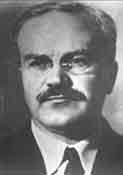Vyacheslav Molotov
(1890 - 1986)

Vyacheslav Molotov, the son of middle-class parents, was born in Kukarka, Russia, on February 25, 1890. He was sent to Kazan to be educated and while there met a group of students who introduced him to the ideas of Karl Marx.
In 1905 joined the Social Democratic Labour Party and after the 1905 Revolution began to associate with the Bolshevik faction of the party. Molotov was soon arrested and sent to Vologda province.
After his release Molotov left Russia to join other Bolsheviks living in exile. He met Vladimir Lenin and it was agreed that he should return to St. Petersburg to organize the distribution of Zvezda, the party newspaper. Later Molotov was to become editorial secretary of Pravda.
The Okhrana attempted to arrest Molotov in 1913 but he managed to escape and went into hiding. Several times he came close to being captured and so he moved to Moscow. However, several police spies had joined the Bolsheviks in Moscow and Molotov was soon arrested and deported to Irkutsk in Siberia.
In 1915 Molotov escaped from Siberia and managed to get to Petrograd where he soon established himself as one of the leaders of the Bolsheviks in the city. He worked closely with Alexander Shlyapnikov and together they helped organize the strikes that resulted in the February Revolution. Molotov also became a member of the Military Revolutionary Committee that planned the October Revolution.
In 1921 Molotov was elected to the Central Committee of the Communist Party and three years later became a member of the Politburo. After the death of Vladimir Lenin in 1924 Molotov switched his support to Joseph Stalin and played an important role in the launching of the Five Year Plan.
In 1930 Joseph Stalin appointed Molotov as his prime minister. When the Jewish origins of Maxim Litvinov created problems for Stalin during his negotiations with Germany in 1939, Molotov became the new Commissar of Foreign Affairs. Soon afterwards Molotov signed the the Nazi-Soviet Pact.
On September 25, 1940, the German foreign minister, Joachim von Ribbentrop sent a telegram to Molotov, informing him that Germany, Italy and Japan were about to sign a military alliance. Ribbentrop pointed out that the alliance was to be directed towards the United States and not the Soviet Union. "Its exclusive purpose is to bring the elements pressing for America's entry into the war to their senses by conclusively demonstrating to them if they enter the present struggle they will automatically have to deal with the three great powers as adversaries."
Molotov already knew about the proposed German-Japanese Pact. Richard Sorge, a German journalist working in Tokyo, was a Soviet spy and had already told Molotov that Adolf Hitler was involved in negotiations with Japan. In Sorge's view, the pact was directed against the Soviet Union but it was not until December 1940, that he was able to send Molotov full details of Operation Barbarossa.
During the Second World War Molotov was at Stalin's side during the conferences held at Teheran (1943), Yalta (1945) and Potsdam (1945). He also attended the San Francisco Conference which created the United Nations.
In 1949. Molotov lost his post when Joseph Stalin appointed Andrei Vyshinsky as his Foreign Minister. After the death of Stalin in 1953, Vyshinsky was sacked and Molotov returned to his old job.
In June 1956, Molotov joined the group that unsuccessfully tried to oust Nikita Khrushchev as the new leader of the Soviet Union. Khrushchev demoted him to the position of ambassador to Mongolia. He was later denounced as being involved in the arrest and execution of Lev Kamenev, Gregory Zinoviev, Nickolai Bukharin, Alexei Rykov and other leading Bolsheviks of the 1930s. In 1964, Molotov was expelled from the party.
Vyacheslav Molotov died in Moscow on November 8, 1986.
Sources: Spartacus Educational


